Harnessing soil carbon sequestration to address climate change challenges in agriculture
Contenu
-
Titre
Harnessing soil carbon sequestration to address climate change challenges in agriculture
Soil and Tillage Research
-
Créateur
Muhammad Junaid Nazir
Guanlin Li
Muhammad Mudassir Nazir
Faisal Zulfiqar
Kadambot H. M. Siddique
Babar Iqbal
Daolin Du
-
Sujet
Agricultural management practices
Carbon dioxide CO
Global warming
Mitigation
UN-SDGs 2030
Zero Tillage
-
doi
10.1016/j.still.2023.105959
-
Résumé
Elevating levels of atmospheric carbon dioxide (CO2), primarily driven by the burning of fossil fuels, combustion of organic matter, and unsustainable land practices, have amplified global concerns regarding climate change. The industrial revolution has propelled the rise in CO2 emissions, leading to anticipated increases in concentrations and alterations in CO2 sequestration within agricultural soils. Land use alterations, encompassing deforestation, biomass burning, changes in agricultural conditions, drainage of natural wetlands, and incorrect soil management practices, have further amplified these emissions. Moreover, the reduction of soil organic carbon (SOC), an outcome of soil degradation and mismanagement, has intensified atmospheric CO2 levels. However, by implementing state-of-the-art land application and contemporary management systems in agriculture, there's potential to slow the rate of CO2 emissions. The restoration of depleted SOC is possible through various strategies, such as converting marginal lands into restorative uses, promoting reduced or zero-tillage practices combined with cover or residue crops, and implementing nutrient cycling via composting, manure application, and other sustainable soil and water management techniques. Long-term soil carbon sequestration is increasingly being viewed as a comprehensive strategy to combat climate change. By rejuvenating depleted soils, enhancing biomass production, purifying surface and groundwater, and offsetting CO2 emissions from fossil fuels, soil carbon sequestration can serve as a holistic and effective approach for mitigating current climatic changes. Adoption of these innovative techniques is crucial in managing the challenges imposed by recent environmental changes, positioning soil carbon sequestration as a promising solution. This review aims to explore the potential methods of mitigating climate change through the implementation of soil carbon sequestration strategies.
